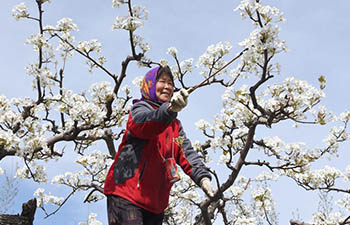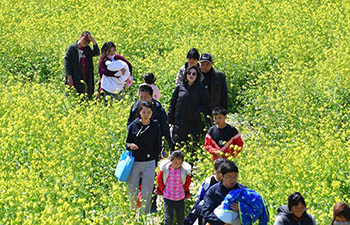SAN FRANCISCO, April 7 (Xinhua) -- Grass seed growers in the U.S. west state of Oregon are keeping close watch on the ongoing U.S.-China trade skirmishes, which they fear would impact their exports to the Asian economic powerhouse, an Oregon daily said Saturday.
The United States and China are locked in a trade dispute after U.S. President Donald Trump threatened unilaterally to impose steep tariffs on Chinese imports worth 50 billion U.S. dollars last month. In response, China announced tariffs up to 25 percent on U.S. exports to China, including farm products, especially corn, soybeans and hogs, which come primarily from the Midwest.
The Albany Democrat-Herald daily said in its online edition that many residents in the Oregon counties of Linn and Benton are paying close attention to the sectors that may be hit by the U.S.-China trade frictions.
"Oregon and the mid-valley may not escape the trade skirmishes, but it's too early to pinpoint which sectors might be affected," it said.
"At this point, from what I hear, grass seed is not included on the proposed tariff list," the paper quoted Mike Baker of Pennington Seed in Lebanon of Linn County as saying.
Baker said the sale of grass seed from the mid-valley to China is significant and the market is expanding, "growing leaps and bounds over the last 10 years."
"We have one really large customer in China to whom we ship many loads of seed," he said.
He noted that China bought a lot of tall fescue and tetraploid annual ryegrass, and they "also buy perennial ryegrass and some Kentucky bluegrass, which mostly comes from central Oregon."
"Anything that increases costs is a real concern to us," he said, adding that tariffs could give a leg up to annual ryegrass growers in Uruguay and Argentina, apart from Oregon's traditional competitors in Europe and Canada.
China announced tariffs on a list of items from the U.S. exports, including soybeans, corn, cotton, brewing/distilling dregs, wheat, beef, fruits, tobacco, SUVs, passenger cars, airplanes of certain sizes, and a variety of chemicals.
Oregon shipped more than 290 million dollars in agricultural products to China in 2017, according to Andrea Cantu-Schomus, director of communications for the Oregon Department of Agriculture.

















